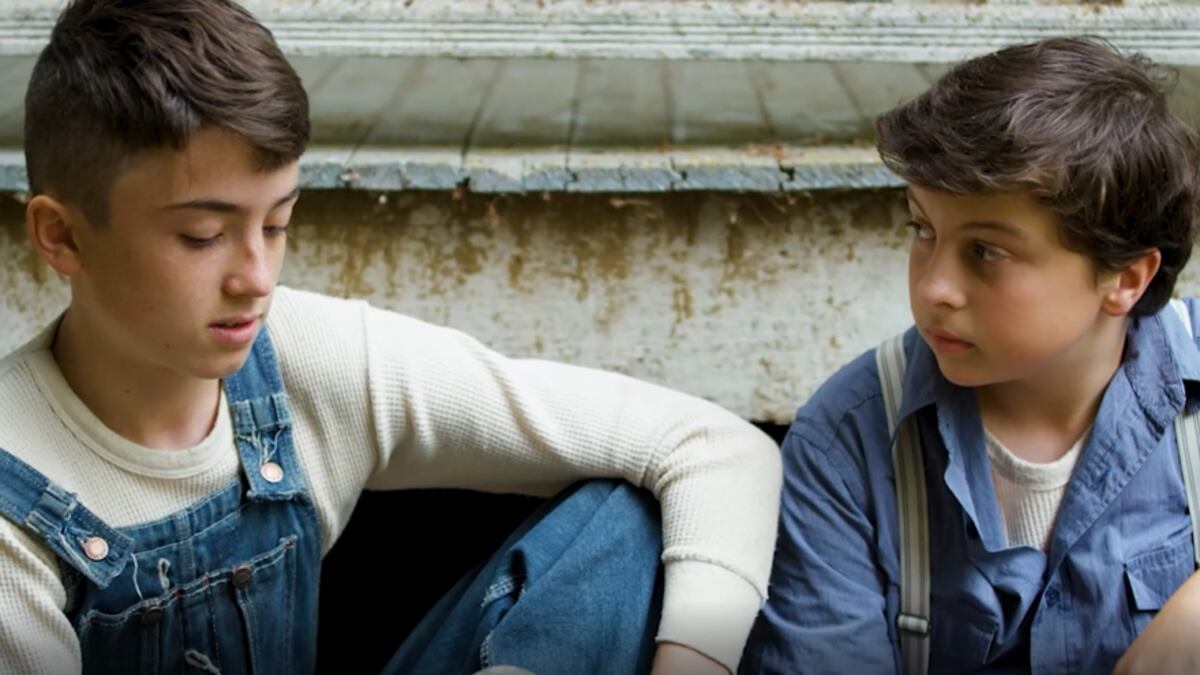Centralia, Wash. isn’t nicknamed “Hub City” for nothing—at least in the experience of two first-time filmmakers with some far-fetched needs for their ambitious debut.
The Lewis County town, which to many is merely an Interstate 5 stopover between Portland and Seattle, played host to local director Leslie Goyette’s new period piece, Maysville. Along with Chehalis, Centralia furnished everything a bootstrap production could need to approximate 1929 Appalachia—from a period-accurate courthouse to barn burnings to vintage cars to wheat fields believable as Kentuckian.
“It was surreal,” says producer Michele Englehart. “‘Oh, you need a 1929 tractor? Well, we have a tractor museum.’”
That restored 1928 Fordson tractor on loan from King Agriculture Museum was a key actor in the saga of Maysville. The plot traces the fallout when 13-year-old Teddy accidentally kills his best friend Willy in a farming joyride gone wrong. After the incident, Teddy is more or less forced into indentured servitude by his friend’s spiteful, alcoholic father. From that inciting trauma to Teddy’s adult attempts to start anew in Maysville, the story strives for a Great American scope, replete with pastoral details inspired by Goyette’s own youth on a Kentucky tobacco farm.
“I was in such a remote part of Kentucky,” says Goyette, who spent her early years in a town called Furnace Mountain and moved to the Northwest in 1990 to study at the University of Oregon. “We had no neighbors, no telephone, no cable. The things you see Teddy and Willy do in 1929, we did in the 1970s. We climbed in the barns, played with guns, and drove tractors. That’s what kids did when you lived off the grid.”
If Goyette’s childhood memories planted the seeds of Maysville, it was her unlikely partnership with producer Michelle Englehart that added water and sunlight. They first met in 2014, when Goyette’s son and Englehart’s daughter were acting in a commercial for DreamWorks. The two mothers connected that day, but were little more than Facebook friends until Goyette suddenly passed along the script for Maysville, thinking of Englehart’s son Forrest for a part.
“I started crying on page 15,” Englehart remembers.
That affirmation was enough to turn lifelong “closet writer” Goyette into an aspiring director and Englehart, a Seattle IT manager, into her producing partner. Considering neither had any experience making a movie, they had to practice even developing the DIY ethos many indie filmmakers know well, cashing in every possible favor, wearing every possible hat.
“Michelle and I say we were nine and a half months pregnant for three years,” Goyette laughs.
While the most recognizable face in Maysville is that of Trin Miller, who appeared in the 2016 Viggo Mortensen-led Captain Fantastic, the movie’s soul hinges on its fleeting Tom Sawyer-esque first act, as Holden Goyette and Forrest Campbell are charged with cementing Teddy and Willy’s preteen brotherhood. Both boys, Goyette says, were exceedingly professional but bonded over what passed for childhood fun in 1929.
“When we were moving sets and cameras, they were talking about skateboarding and about how running in the field would’ve been so boring when they were kids,” she explains. “They just laughed, and I think that comes across on screen.”
On a stylistic level, the atmosphere of Maysville belies its micro-budget, as Goyette aimed to bottle the bygone prestige of violin-soaked Hollywood epics that contended for Oscars in the late 20th century.
“There are no long pauses where the actor looks over across the abyss,” says Goyette, offering Rob Reiner’s Stand By Me and Steven Spielberg’s The Color Purple as particular touchstones for her. “This is not a Nomadland; it’s not an arthouse film.”
Talking of its Hollywood influences, if there’s one Goyette sought to avoid, it was the legacy of “Dueling Banjos” and Deliverance dominating Appalachia’s cinematic legacy. Even so, one of the film’s most interesting bits of trivia is the participation of Phillip Steinmetz, the great nephew of banjoist Grandpa Jones of Hee Haw and Grand Ole Opry fame. Steinmetz’s bluegrass contributions are limited to a brief wedding scene.
That plucking aside, Goyette expresses pride in how the Northwest stood in for her old stomping grounds. The story of Maysville is, in many ways, about how families are often doomed to live in the past but communities don’t. It’s their ability to welcome newcomers that keeps them alive, whether it’s 1929 Maysville to a desperate Teddy or 2019 Centralia to two outsiders who really need a 90-year-old tractor.
SEE IT: Maysville streams on Amazon, Google Play and YouTube.
